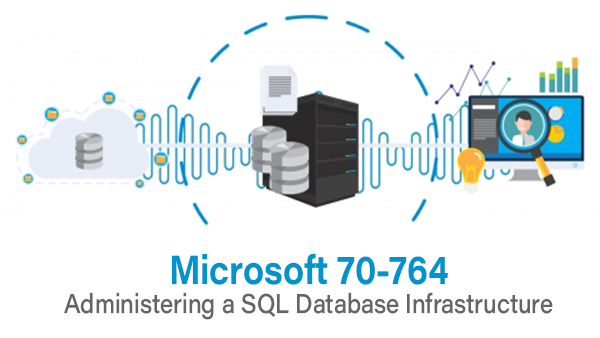Microsoft 70-764 : Administering a SQL Database Infrastructure
Preparation for Microsoft Certification Exam 70-764. By the end of this course, you will be able to administer a Microsoft SQL 2016 server. This course is intended for IT professionals responsible for installing and maintaining a Microsoft SQL Server environment.
Outline
Module 1: Encryption
- 1.1 Introduction
- 1.2 Exam Objectives and Lab Setup
- 1.3 Restoring AdventureWorks 2016 Database Lab Part 1
- 1.4 Restoring AdventureWorks 2016 Database Lab Part 2
- 1.5 Restoring AdventureWorks 2016 Database Lab Part 3
- 1.6 Configure Encryption
- 1.7 Cell-Level Encryption Part 1
- 1.8 Cell-Level Encryption Part 2
- 1.9 Cell-Level Encryption Lab Part 1
- 1.10 Cell-Level Encryption Lab Part 2
- 1.11 Transparent Data Encryption
- 1.12 Transparent Data Encryption Lab
- 1.13 Always Encrypted
- 1.14 Always Encrypted Lab
- 1.15 Backup Encryption
- 1.16 Backup Encryption Lab
- 1.17 Connection Encryption
- 1.18 Encryption Troubleshooting
Module 2: Configure Data Access and Permissions
- 2.1 Create and Maintain Users
- 2.2 Create and Maintain Users Lab Part 1
- 2.3 Create and Maintain Users Lab Part 2
- 2.4 Configure and Maintain Custom Roles
- 2.5 Configure and Maintain Custom Roles Lab
- 2.6 Manage Database Object Permissions Part 1
- 2.7 Manage Database Object Permissions Part 2
- 2.8 Manage Database Object Permissions Lab Part 1
- 2.9 Manage Database Object Permissions Lab Part 2
- 2.10 Configure User Options for Azure SQL Database
- 2.11 Configure Row-Level Security
- 2.12 Configure Dynamic Data Masking
- 2.13 Configure Dynamic Data Masking Lab
Module 3. Configure Auditing
- 3.1 Manage a SQL Server Audit
- 3.2 Manage a SQL Server Audit Lab
- 3.3 Query the SQL Server Audit Log
- 3.4 Manage an Azure SQL Server Audit
Module 4: Develop a Backup Strategy
- 4.1 Backup Types Part 1
- 4.2 Backup Types Part 2
- 4.3 Manage, Backup, and Restore Databases Lab Part 1
- 4.4 Manage, Backup, and Restore Databases Lab Part 2
- 4.5 Backup Very Large Databases Part 1
- 4.6 Backup Very Large Databases Part 2
- 4.7 Backup Very Large Databases Part 3
- 4.8 Backup Very Large Databases Part 4
- 4.9 Managing Very Large Databases Lab Part 1
- 4.10 Managing Very Large Databases Lab Part 2
- 4.11 Managing Very Large Databases Lab Part 3
- 4.12 Configure Alerting for Failed Backups
- 4.13 Configure Alerting for Failed Backups Lab Part 1
- 4.14 Configure Alerting for Failed Backups Lab Part 2
- 4.15 Back up Databases to Azure
- 4.16 Manage Transaction Log Backups
- 4.17 Configure Database Recovery Models
- 4.18 Set Database Recovery Model Lab
- 4.19 Configure Backup Automation
- 4.20 Configure Backup Automation Lab
Module 5: Restore Databases
- 5.1 Perform Piecemeal Restores
- 5.2 Restore Databases Lab Part 1
- 5.3 Restore Databases Lab Part 2
- 5.4 Restore Databases Lab Part 3
- 5.5 Perform Page Recovery
- 5.6 Perform Point-in-Time Recovery
- 5.7 Perform Point-in-Time Recovery Lab
- 5.8 Restore File Groups
- 5.9 Develop a Plan to Automate and Test Restores
Module 6: Manage Database Integrity
- 6.1 Implement Database Consistency Checks
- 6.2 Implement Database Consistency Checks Lab
- 6.3 Identify Database Corruption
- 6.4 Recover From Database Corruption


Reviews
There are no reviews yet.